Do you want to travel to a developing country (or simply travel), but think it’s impossible? Don’t dismiss the thought. It might take a little extra planning, some additional help (how much depends on your disability) and possibly a little extra cash. But it’s well worth the effort.
Me, Travel?
In 1999 I was asked if I would be interested in traveling internationally with a nonprofit organization to distribute wheelchairs. I literally laughed out loud. Me? A quad? But with a little coaxing, six months later I found myself in the mountains of Mexico for the first time. The experience literally changed the course of my life. The following year I decided to work full-time with this organization.
For eight years I traveled and worked in developing countries distributing wheelchairs to people who had never had the opportunity to have mobility equipment. Since 2009 I have worked for an international non-profit organization caring for people who work cross-culturally. I have spent the majority of my time in Mexico and Afghanistan, but have also been in Costa Rica, El Salvador, the United Arab Emirates, Turkey, North Africa, India, Spain, Italy and cities throughout Europe for “pit stops.”
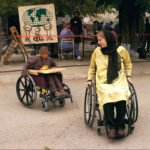
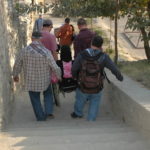
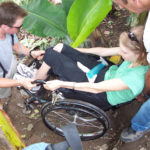
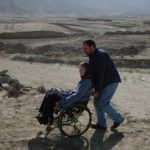
What I’ve Discovered
Over the years I have discovered that working and traveling in developing (and supposedly already-developed) countries is possible. But there’s a catch: patience and a little extra help are usually necessary. Below are 9 important points to ponder.
Personal Care
Will you need help with personal care? If so, take someone along with you that is willing to help you. If you are staying for an extended period or planning on returning often, train a national to help you. Employing a national is a wonderful way to build relationships!
Independence and Accessibility
Just because you are completely independent here in the States, don’t assume you will be in a developing country. Why? The ADA does not accompany you. Your chair may not fit into the bathroom. The place you stay may not have a ramp. Don’t expect things to change simply because you have arrived.
Learn Humility
You may not like to accept help, but when terrain is rough, hills are steep, steps are to be “climbed” and temperatures are extreme, be willing to accept – or ask for – help. I always hope to set an example that a wheelchair user can function independently, but I must balance independence and my overall health.
Plan around Your Needs
When on a flight of more than 8 or 9 hours, I break the trip up into segments. I’ll have a 24-hour layover in Europe and get a hotel room to get off my bottom before getting on another long flight. If I arrive with skin breakdown because I pushed my body beyond what it can endure, the trip will be ruined. Be aware of what your body needs. Everyone is different, so don’t be discouraged or embarrassed if you need more down time, rest or assistance than others.
You Aren’t in Kansas Anymore, Toto
So don’t complain when things aren’t accessible. That doesn’t mean you won’t get frustrated or irritated or tired of being carried up steps. I try to tell myself, “If others with disabilities can live here their entire lives in these conditions, I can do this for a couple weeks.”
Educate Yourself
Know as much about the location you are going to as possible. Talk with others who have been there, especially others with disabilities. For example, if weather conditions will be extreme (and if no heat or AC are available), how do you plan on coping? What type of transportation will be available? What is the cultural or religious beliefs about disability?
Expect the Worst
Leave any expectations of accessibility at the airport before you leave. Then when you can actually get into the bathroom, do a happy dance!
Go Prepared
Take extra catheters, medical supplies, medication (including antibiotics for UTIs and traveler’s diarrhea), Allen wrenches, cushion and tire patches (or use solid tires). A trip may get extended due to airline issues, medical emergency, political unrest or natural disaster.
Be an Educator
If you are traveling with a group, does the organization “get” your disability and comprehend what may be involved in inaccessible conditions? Your job is to be an educator. Explain what your needs may be (e.g., assistance in/out of buses, up/down steps, etc.).
I hope these tips encourage you to consider traveling. The time I have spent in other countries has been worth every ounce of effort. With the right planning and an open mind, any adventure is do-able!
Have you ever helped with a humanitarian outreach or traveled the back roads of a developing country? If so, please comment below. What did you learn from your experience?

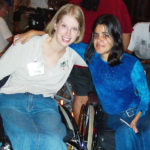



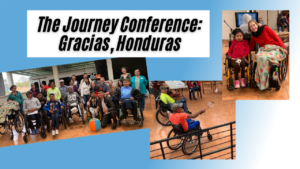





Comments are closed.